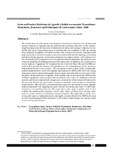| dc.description.abstract | The article discusses the nature and dynamics of structures and processes of state and society relations in Uganda and the political and economic outcomes in the country. Empirical data from the Economic Commission for Africa (ECA)/Expert Opinion Survey (EOS) and Focus Group Discussions in Uganda that was compiled in 2011 are among those analyzed. In addition, literature on these state structures (executive, legislature and judiciary) and on elections as spaces, processes and institutions for defining, arbitrating and determining outcomes of structure and processes of governance, with emphases on the 18 February 2011 and prior to the Presidential and Parliamentary Elections are also used to triangulate the findings and enrich the discussion. In addition, the results from a recent study on ‘Uganda @ 50’ conducted by the Centre for Basic Research (CBR) are used to fore ground the opinions of Ugandans on the contemporary social structures and political trends in the country. The conclusion is that in spite of the considerable politico-administrative reforms in Uganda especially from 1986 to 2005, there are strong indications of regressions in the quality of governance since then that warrant concern for the future democratization in Uganda. Some notable reforms during the pre-2006 period included significant trends towards decentralization, the return to multiparty political systems, and the development of a progressive constitution with pronounced frameworks for pursuing democratic governance through accountable and transparent institutions of governance. Most of these constitutional provisions are now being reversed. Uganda today demonstrates the trappings of a post-colonial non-democratic state in which state structures serve partisan interests. The army takes centre stage in politics and in turn enables the authoritarian character of the state where elections have become mere pretences and a mockery of substantive democratization. The independence of the three arms of the state is simply pretentious and highly circumscribed by the NRM to be used at will in legitimizing its hold onto power. Unless these trends change, the country could revert to its tyrannical past. | en_US |

